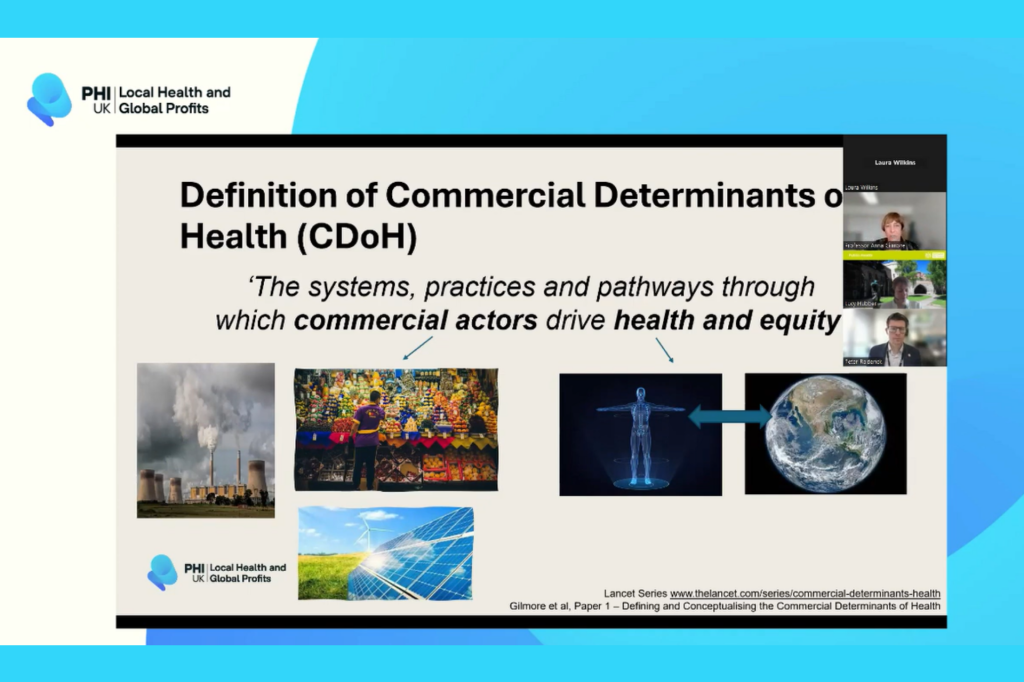Caroline Cerny, Deputy Chief Executive at Action on Smoking and Health, writes a guest blog for PHI UK to mark Mental Health Awareness week
Mental health conditions are among the most common health issues, influencing quality of life and placing pressure on health and social care systems.
Tobacco, alcohol and unhealthy foods are a cause and a consequence of mental ill health.
Government should use strong, evidence-based measures to give people the ability to enjoy better mental and physical health.
This Mental Health Awareness Week is a timely opportunity to look at the structural and systemic influences on our mental wellbeing.
Mental ill health is one of the most prevalent health issues in our society, affecting one in six adults and putting pressure on health and social care systems. To date, attention has focused on the social and environmental determinants of mental health. The commercial factors may be less discussed but are equally critical. These are the systemic, profit-driven influences that disproportionately harm those already living with mental illness or at heightened risk due to socioeconomic disadvantage.
The relationship between mental health and harmful commercial products such as tobacco, alcohol, and unhealthy food flows in both directions. Unhealthy products can cause mental ill health, and people with existing poor mental health are more likely to use them, often leading to worse physical and mental health.
Tobacco and mental health
Around 11.6% of people smoke. This rises to 41% in people with severe mental illness. In fact, smoking alone accounts for two-thirds of the reduced life expectancy in this group. There is growing evidence that smoking is not just co-occurring but causative, with evidence pointing to the role that tobacco plays in the development of conditions such as schizophrenia and depression.
Alcohol and mental health
Alcohol can also act as both a cause and consequence of mental ill health. Nearly three-quarters of adults entering alcohol treatment report mental health needs. People with common mental disorders are twice as likely to have an alcohol use disorder and individuals with alcohol dependency are approximately 2.5 times more likely to die by suicide, with research indicating that nearly half of all patients under mental health care who die by suicide have a history of alcohol misuse.
Unhealthy food and mental health
The role of unhealthy diets and food insecurity is increasingly evident. Diets high in ultra-processed food are associated with increased risk of depression and anxiety, while people with mental health conditions are more likely to have poor-quality diets. Chronic stress and poverty reduce cognitive bandwidth, increasing reliance on foods that are typically low-cost and low nutrition. Food insecurity itself is a significant predictor of poor mental health, particularly in unequal societies.
Commercial tactics driving mental ill health
The commercial practices driving these patterns are well-documented. Industries concentrate harmful product advertising and retail outlets in poorer communities. Unhealthy food and drink adverts are six times more prevalent in deprived areas, and fast-food outlet density is twice as high in the most deprived local authorities. These same industries then deflect responsibility by framing consumption as a matter of individual choice - a tactic documented across tobacco, alcohol, and food sectors.
Effective interventions
Yet effective interventions exist. Scotland’s minimum unit pricing for alcohol reduced consumption by 3–3.5%, It also reduced alcohol-specific deaths by 13.4%, with the most deprived communities seeing the greatest benefit. The UK’s Soft Drinks Industry Levy cut sugar content in drinks without reducing industry revenue, and advertising restrictions on Transport for London reduced exposure to unhealthy products.
Shaping better mental health outcomes
The evidence is clear: commercial organisations play a significant and measurable role in shaping mental health outcomes as well as physical health. Governments therefore need to use strong, evidence-based measures to give people the truly free choice of enjoying better mental and physical health. This should include regulating harmful products, taxing their harms and ultimately holding industries accountable for the environments they shape ensuring that those with the fewest resources are not most exposed to risk.
Read more
LHGP consortium partners Action on Smoking and Health, the Alcohol Health Alliance, the Obesity Health Alliance and the Centre for Mental Health have collaborated on a briefing on the commercial determinants of health, with a focus on tobacco, alcohol and unhealthy food and drink





